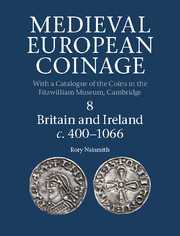Book contents
- Frontmatter
- Contents
- List of plates
- List of figures
- List of maps
- List of tables
- Preface
- Note on spelling
- List of abbreviations
- 1 Introduction
- 2 From Roman Britain To Anglo-Saxon England
- 3 Early Anglo-Saxon Gold Coinage
- 4 The Early Silver Pennies
- 5 The Kingdom Of Northumbria
- 6 The ‘Mercian Supremacy’ In The Age Of Offa And Coenwulf
- 7 The Rise Of Wessex In Southern England
- 8 The Reign Of Alfred The Great
- 9 England From Edward The Elder To Edgar's Reform
- 10 The Late Anglo-Saxon Coinage
- 11 The Anglo-Viking Coinages
- 12 Wales And Scotland
- 13 The Isle Of Man And ‘Irish Sea’ Coinages
- 14 Ireland To 1170 (with Andrew Woods)
- APPENDICES
- Bibliography
- CATALOGUE
- Concordances
- Indexes
5 - The Kingdom Of Northumbria
Published online by Cambridge University Press: 11 May 2017
- Frontmatter
- Contents
- List of plates
- List of figures
- List of maps
- List of tables
- Preface
- Note on spelling
- List of abbreviations
- 1 Introduction
- 2 From Roman Britain To Anglo-Saxon England
- 3 Early Anglo-Saxon Gold Coinage
- 4 The Early Silver Pennies
- 5 The Kingdom Of Northumbria
- 6 The ‘Mercian Supremacy’ In The Age Of Offa And Coenwulf
- 7 The Rise Of Wessex In Southern England
- 8 The Reign Of Alfred The Great
- 9 England From Edward The Elder To Edgar's Reform
- 10 The Late Anglo-Saxon Coinage
- 11 The Anglo-Viking Coinages
- 12 Wales And Scotland
- 13 The Isle Of Man And ‘Irish Sea’ Coinages
- 14 Ireland To 1170 (with Andrew Woods)
- APPENDICES
- Bibliography
- CATALOGUE
- Concordances
- Indexes
Summary
HISTORICAL INTRODUCTON
Æthelfrith (d. 616) was the first king to unite the Deirans and Bernicians (Dumville 1989b), creating the kingdom of the Northumbrians, though its two major component peoples retained their own dynasties and power-bases which shaped the subsequent development of the kingdom: the vales of Pickering and York figured prominently in Deira, the lower Tyne and the area of Bamburgh, Yeavering and Lindisfarne in Bernicia (Wood 2008). Æthelfrith – a Bernician – was defeated and replaced by Edwin (616–32), a Deiran royal exile who was the first Northumbrian king to accept Christianity. Politically, Edwin's accession marked the beginning of the high-water mark of Northumbrian influence in Britain, and of close relations with southern England (Yorke 2009a, 88–95; Fraser 2009, 166–99). Bede claimed that Edwin and his successors Oswald (634–42) and Oswiu (642–70) held supremacy across all England (Bede, HE ii.5), and in the late seventh century Ecgfrith (670–85) vied with the Mercians for control over the Humber and the surrounding region (Yorke 1990, 72–86). Later kings intervened less often south of the Humber, but were nonetheless forces to be reckoned with (Yorke 1990, 94–5). Northumbrian kings continued to rule the lands of the Bernicians and Deirans until the Viking conquest and settlement of the 860s–870s; thereafter, Scandinavian rulers held York and the south of the kingdom (see Chapter 11, section (a) and (i), pp. 279–81 and 292–301), while a line of independent earls ruled the north from Bamburgh, eventually under West Saxon suzerainty (Rollason 2003; Higham 1993).
Seventh- and early eighth-century Northumbria is well known thanks to a remarkable body of literature and art produced by its churches. The venerable Bede (d. 735) – a scholar of international renown – is the most celebrated representative of this Northumbrian renaissance, while the Lindisfarne Gospels (London, British Library, Cotton Nero D.IV: Brown 2003), Codex Amiatinus (Florence, Biblioteca Medicea-Laurenziana, Amiatinus 1) and Ruthwell Cross are among its most impressive surviving artefacts (Blair 1976; 1990, 117–309; Wormald 1982a; DeGregorio 2010; Higham and Ryan 2013, 153–72; Ó Carragáin 2014). These achievements emphasise both the refinement and the diversity of the Northumbrian Church, which was influenced by Brittonic, Irish and Roman traditions.
- Type
- Chapter
- Information
- Medieval European Coinage , pp. 111 - 127Publisher: Cambridge University PressPrint publication year: 2017

